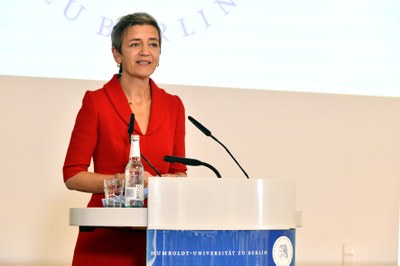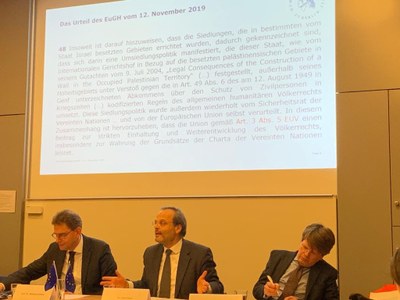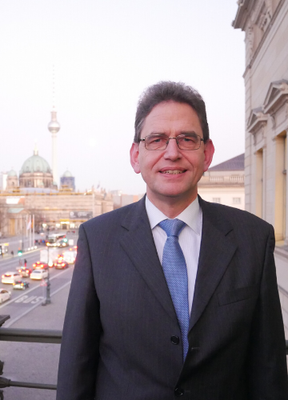News and Events
Winter Semester 2021/22
Humboldt Speech on Europe with Mrs. Margrethe Vestager, Executive Vice President of the European Commission
On 25th October, the Executive Vice President of the European Commission, Margrethe Vestager, held a Humboldt-Speech on Europe on the topic of "democratic values in a digitalised Europe". It was the first Humboldt-Speech since the beginning of the pandemic that was held in a full Senate Hall in the main building of the Humboldt University. In her speech, Mrs. Vestager stressed the importance of having individual rights in the digital space, of data protection and the control over giant tech companies. The speech was followed by a discussion, in which Mrs. Vestager answered many insightful questions that arose from the audience.

The recording of the full event can be accessed through this link.
Summer Semester 2020
Winter Semester 2019/2020
WHI-Workshop regarding EUGH C-363/18 Provision of food information to consumers regarding food from Israeli settlements in the territories occupied by the state of Israel

On the 17th of december another workshop took place in the Walter Hallstein Library.
Here, Dr. Felix Klein, Federal Government Commissioner for Jewish Life in Germany and the Fight against Anti-Semitism and Prof. Dr. Christoph Möllers, together with Prof. Dr. Matthias Ruffert and other interested participants, discussed the mandatory labelling of food from Israeli settlements in the territories occupied by the State of Israel on the occasion of the recent ruling of the European Court of Justice in Case C-363/18.
Humboldt-Speech on Europe from Dr. Wolfgang Schäuble, President of the German Parliament
On the 5th of December, the President of the German Bundestag, Dr. Wolfgang Schäuble, gave a speech,
a Humboldt speech on Europe in the full Senate Hall in the main building of the Humboldt University. In the speech he called for faster action and an end to hesitation and procrastination on the multidimensional problems that face us. Europe could not only be a "continent of good conscience".
In digitisation, he said, Europe needed a new dynamism and a business location that would set itself apart from the powerful players from Silicon Valley and those from China, especially when dealing with sensitive data.
In the field of climate protection, it was up to Europe to play a pioneering role after the USA withdrew from the Paris Climate Protection Agreement and to push ahead with global goals through its own example and minimum standards in free trade agreements. Climate protection as a global challenge also requires massive investments by the EU in Africa, South America and Asia, as the climate can be protected much more effectively there.
Additionally, more should be ventured at an institutional level, such as the direct election of the future Commission President. New impulses for the further development of the treaties are urgently needed and should also come from the European Parliament. In his opinion, the current problems can also be seen as opportunities to push ahead with deeper reforms. However, the aim cannot be the "constitutional finality" of the European Treaties at present, but a Europe that can "guarantee freedom, security and prosperity in a globalised world".
After the speech, the topic of asylum policy in particular was taken up by the audience. The President of the Bundestag called for an increased search for human rights-compliant solutions outside the EU and stronger action against gangs of smugglers.
The text of the speech in german can be found at
https://www.bundestag.de/parlament/praesidium/reden/2019/057-676066
The recording of the speech can also be accessed in german here:
Humboldt-Speech on Europe by Prof. Dr. Linos-Alexandre Sicilianos, President of the ECHR
On the 19th of November, Prof. Dr. Linos-Alexandre Sicilianos, President of the European Court of Human Rights, was a guest at Humboldt University and spoke about the ECHR and its current challenges.
First, the speaker made it clear that all challenges must be seen against the background of the far-reaching effects of the judgments of the ECHR and that this also puts strong pressure on the judges. In this context, he also explained the Court's defining live-instrument doctrine, which states that the ECHR must always interpret the European Convention on Human Rights in the light of the present, right up to the limit of the wording.
He then focused on the problems of the ECHR as an institution. For example, 60,000 cases are currently pending before the 47 judges, of which almost 1000 are highly explosive in political and legal terms. In addition to the mass of cases, he recognised the enforcement of judgments as a further problem.
As case-related current challenges he cites interstate disputes, such as the territorial conflict between Azerbaijan and Armenia over the Nagorno-Karabakh region, the issues of residence and deportation related to the refugee crisis, terrorism and widespread democratic deficits and populism in Europe.
After the speech, the opportunity for discussion with Mr Sicilianos was taken by many committed students and doctoral candidates.
Here you can see the Recording of the speech





